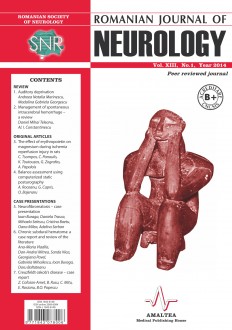SELECT ISSUE

Indexed

| |

|
|
|
| |
|
|
|

|
|
|
|
|
|
| |
|
|
HIGHLIGHTS
National Awards “Science and Research”
NEW! RJN has announced the annually National Award for "Science and Research" for the best scientific articles published throughout the year in the official journal.
Read the Recommendations for the Conduct, Reporting, Editing, and Publication of Scholarly work in Medical Journals.
The published medical research literature is a global public good. Medical journal editors have a social responsibility to promote global health by publishing, whenever possible, research that furthers health worldwide.
AUDITORY DEPRIVATION
Andreea Natalia Marinescu and Madalina Gabriela Georgescu
ABSTRACT
Prelingual deafness deprives the auditory cortices areas from the physiological stimulus which is mandatory for the normal anatomical and physiological development of the cortex.
In the absence of immediate intervention appropriate for auditory abilitation, the auditory cortex will lose its specific capacity to process the auditory informations. This phenomenon is known as auditory deprivation.
Due to the cerebral plasticity, conventional hearing aids or cochlear implants use allow the reorganisation of the cerebral auditory structures in order to regain their capacity to process correctly the sounds and the child to hear.
Age of implantation is determinant for the benefit obtained by deaf children with cochlear implants. As soon as the implantation occurs, the acoustic exposure of the hearing impaired children increases as well. Early exposure to sounds allows the deaf child to understand speech better and to develop language better. Prelingually deaf children, implanted by the age of two, develop speech and language skills similar to their normal hearing peers.
Keywords: congenital hearing loss, auditory deprivation, cochlear implant
